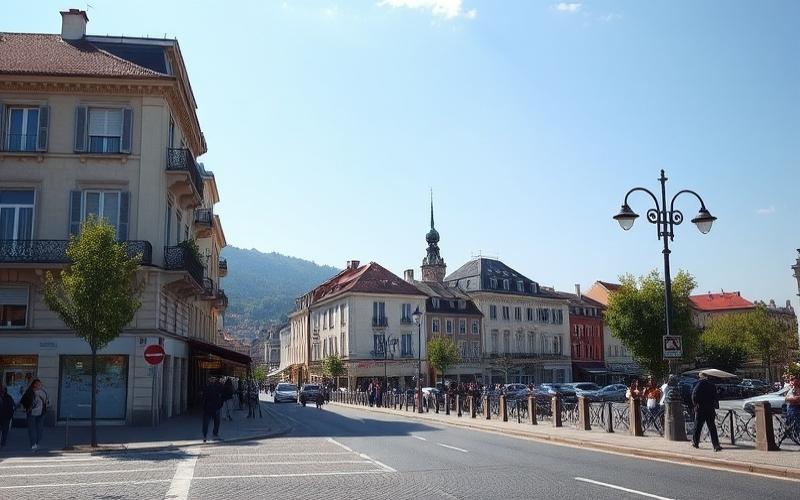
 Published on and written by Cyril Jarnias
Published on and written by Cyril Jarnias
In Switzerland, a country renowned for its academic excellence and high quality of life, the demand for student housing continues to grow, thus attracting investor interest. With an ever-increasing student population and a stable real estate market, the appeal of student residences as an investment is strengthening. However, strict regulations, high construction costs, and increased competition pose challenges for those looking to embark on this promising venture. This article explores the opportunities and risks associated with this potentially lucrative investment and examines whether student residences in Switzerland represent a wise choice for savvy investors.
The Swiss Student Housing Market
Overview of the current Swiss student housing market
The Swiss student housing market is characterized by structurally higher demand than supply, particularly in major university cities. The average vacancy rate remains very low: in Zurich, it was 0.8% in 2025, down from an already low 1.1% in 2023. This imbalance leads to high competition for access to student housing and exerts upward pressure on rents.
In most Swiss cantons, the overall vacancy rate remains below the threshold considered “regulated” (1.5%), highlighting the persistent strain on the housing stock intended for students. The existing supply is insufficient to absorb the expected growth in the number of students until 2045.
Comparative Table – Supply and Demand by Region
| City | Vacancy Rate (2025) | Available Supply | Student Demand |
| Zurich | 0.8% | Insufficient | Strong |
| Geneva | Very Low | Very Insufficient | Strong |
| Lausanne | Benefits of investing in student real estate |
Advantages of Investing in Swiss Student Real Estate
- Sustained Rental Demand: The large student population, particularly in major Swiss university cities like Lausanne, Geneva, and Zurich, guarantees constant demand for student housing. This continuous flow of domestic and international students promotes a low vacancy rate and optimal occupancy of properties.
- Stability of the Swiss Real Estate Market: The Swiss real estate market remains particularly resilient to global economic fluctuations. In 2025, an average rent increase of 1.9% nationally was observed, along with a rise in residential prices between 3% and 4%, underscoring the structural strength of the sector.
- Attractive Yields: Student residences typically offer a net yield between 3.5% and 5%, higher than that seen in other traditional residential real estate segments or in some neighboring markets. This profitability potential is explained by the rental pressure in the student segment and the flexibility of occupancy (annual or seasonal rental).
- Institutional Support and Modern University Infrastructures: Switzerland continuously invests in its academic infrastructure (world-renowned federal polytechnic universities) and in urban development to accommodate this growing population. Public policies aim to encourage the construction of student housing to address the recurring shortage observed each academic year.
- Wealth Diversification: Integrating properties dedicated to student housing allows investors to broaden their real estate portfolio with an asset less correlated to the general economic cycle while benefiting from the specific demographic dynamism of this segment.
Illustrative Example:
| City | Estimated Student Population | Average Occupancy Rate | Net Rental Yield |
| Lausanne | >40,000 | >97% | ~4.2% |
| Geneva | >30,000 | >96% | ~4% |
| Zurich | >60,000 | >98% | ~3.8–4% |
- Potential Tax Incentives: Some Swiss municipalities or cantons implement temporary tax relief or facilitate administrative procedures for investments explicitly targeting new or renovated student housing stock; these measures vary by area but locally contribute to improving the overall after-tax yield.
Summary List of Key Strengths:
- Stable demand linked to the continuous flow of students
- Swiss market protected against external volatility
- Higher profitability compared to other residential assets
- Incentive public policies to support this segment
- Some of the most high-performing university infrastructures in Europe
- Effective tool for diversifying real estate wealth
Key Takeaway
Investing in Swiss student real estate combines stability, attractive profitability, and rental security thanks to a dynamic academic environment supported by ambitious public policies. This type of asset stands out as a relevant solution both for securing and energizing a modern real estate portfolio.
Good to Know:
Investing in student real estate in Switzerland offers several notable advantages. The large student population, fueled by excellent university infrastructures like the University of Geneva and the Swiss Federal Institute of Technology Lausanne, ensures constant rental demand. Furthermore, the Swiss real estate market is renowned for its stability, offering attractive yields despite global economic volatility. According to a recent study, yields in this sector can reach 4 to 6%, surpassing other real estate segments. Government policies favor this investment by offering attractive tax incentives for investors. Diversifying the real estate portfolio through the integration of student residences is strategic, minimizing risks associated with other types of assets. Indeed, with an annual growth in the number of students of 2 to 3%, profitability forecasts remain positive, reinforcing the appeal of this type of investment in Switzerland.
| Criteria | University Residences | Erasmus Shared Apartments |
| Average Monthly Cost | Between 500 and 900 CHF depending on the city and standard | Between 450 and 800 CHF per room, variable depending on supply |
| Cultural Experience | Mainly meeting other international students, sometimes more culturally homogeneous | Strong multicultural immersion, shared living with locals or other Europeans |
| Comfort | Single or shared rooms, adapted facilities (laundry, internet), but standardized comfort; little possibility for personalization | Highly variable comfort: depends on the chosen apartment; possibility to personalize one’s space |
| Proximity to University | Often located immediately near campuses | Can vary: some apartments are close to universities, others less so |
| Social / Networking Opportunities | Strong organized community life (student parties, university events), network centered on the local academic community | Intense social opportunities thanks to cultural plurality; rapid creation of a broader international and friendly network |
| Return on Investment for Owners | Stable rental yield ensured by institutional contracts with universities. High turnover but low rental vacancy. Regular maintenance required. Constant demand in major Swiss university cities. | Sometimes higher profitability if shared apartment is optimized (several rooms rented separately) but more complex management (high turnover, risk of unpaid rent). Strong attractiveness for foreign students seeking flexibility and a friendly experience. |
Advantages of University Residences:
- Administrative security (institutional lease)
- Structured student life
- Campus proximity
- Facilitated maintenance
Disadvantages of University Residences:
- Less freedom in choosing housing
- Less immersion in local culture outside the university sphere
- Limited spots
- Cost often lower than residences depending on local supply
- Intense daily cultural enrichment
- Flexibility in choosing the neighborhood or type of housing
- Mutual support among roommates for administrative procedures
- Uneven quality/standard depending on available apartments
- Potential risk of conflicts or disagreements in shared living
- Possible distance from campus
Effect on Real Estate Return on Investment in Switzerland:
Both options benefit the particularly tight Swiss student rental market around major cities like Geneva, Lausanne, or Zurich. Residences ensure stable profitability thanks to continuous demand linked to annual student flows, while shared apartments often allow for a higher yield through “per-room” rental but require increased management.
For a foreign Erasmus student in Switzerland:
- The university residence offers administrative comfort and academic proximity.
- Shared apartment living allows for maximum linguistic/cultural immersion and a broader social network – ideal for fully discovering the host country.
The choice will therefore depend on personal priorities: security/comfort versus adventure/enriching human experience.
Good to Know:
In Switzerland, university residences, generally more affordable with an average monthly cost of around 500 to 800 CHF, offer a structured environment close to campuses, while Erasmus shared apartments, with rents varying from 600 to 1,200 CHF depending on the city, offer enriching cultural immersion and geographical flexibility. University residences guarantee comfort, security, and proximity, ideal for a foreign student wishing to minimize travel. On the other hand, shared apartments prioritize social interactions and networking with students from diverse backgrounds, thus stimulating the intercultural experience. For owners, investing in a shared apartment can be more profitable due to constant demand and the possibility of sharing spaces among several tenants, but residences offer a more stable rental flow with often annual contracts. The choice between these options therefore depends on the student’s personal priorities and the investor’s financial objective.
Disclaimer: The information provided on this website is for informational purposes only and does not constitute financial, legal, or professional advice. We encourage you to consult qualified experts before making any investment, real estate, or expatriation decisions. Although we strive to maintain up-to-date and accurate information, we do not guarantee the completeness, accuracy, or timeliness of the proposed content. As investment and expatriation involve risks, we disclaim any liability for potential losses or damages arising from the use of this site. Your use of this site confirms your acceptance of these terms and your understanding of the associated risks.

















































